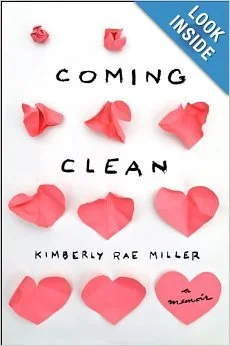Book Club: Coming Clean -Kimberly Rae Miller
This month the Organizing Maniacs team read Coming Clean, a memoir by Kimberly Rae Miller. Kimberly grew up in a house full of love, laughter, tears, and also clutter. As she relates her story to us, we find out with her that her home has more clutter than the typical family and that her parent’s relationship with ‘stuff’ is both intense and the focus of the household.
Coming Clean begins with Kimberly as a young child and takes the reader all the way through to her present day self. As Kimberly’s past self grows up, both she and us start to see that something isn’t quite right with her family. Her dad keeps too much stuff and it’s really quite important that the neighbors not know what the inside of the home look like. Kimberly describes the stages of awareness and her first introduction to the term ‘hoarding’ in a beautifully honest way. This memoir has everything that one might expect from a book about hoarding – clutter, dirt, insects, arguments, struggle, shame, and despair. What I didn’t expect, however, and what was to me the most powerful part of the story was the overriding theme of love keeping everything together. Kimberly and her family went through some pretty terrible times together, from visits from Child Protective Services, to having no running water, and a fire burning down an entire house, but through it all they remained a family.
Kimberly’s story was at times hard to read because of the graphic imagines of her family’s hoard and the repercussions it had on their lives. However, it wasn’t at all a depressing tale. Kimberly describes her childhood within a framework not much different than mine. I know this is hard to believe, as I did not grow up in a hoarded home, but while reading it I really couldn’t avoid thinking how normal this family was. For this reason, I suggest anyone dealing with hoarding read this memoir. It’s so easy to let the clutter overshadow the people in the situation. People become little more than the vessel through which the clutter enters the home. We forget that inside that hoard is a person going through life with feelings, situations, and humanity just like you and me. Coming Clean is a powerful reminder of this.
Kimberly wanted nothing more than to escape the living situation of her youth, but never wanted to escape her parents. She comes back time and time again to help them out of situations and even recruits her friends to help when things get desperate. She argues with her mother and father, cries herself to sleep, and still suffers panic attacks from memories associated with the condition of her childhood home. What the reader realizes, however, is that to some degree, we all experience this evolution as we grow from children into adults. We want to leave our parents home, find who we are, change the things we didn’t like, but generally continue to love our parents, seek their approval, and worry about their well-being.
As a professional organizer, I found this story and it’s ability to humanize a perplexing disorder to be invaluable to my professional development. It is easy to stand in judgment of other people; it’s much more difficult to approach the situation from a position of true compassion and support, but so important to do so. I highly recommend this book to professionals dealing with hoarding clients and to individuals who have family members struggling with a hoarding disorder.
Happy Organizing!

